- As for the matters of structure of health care delivery system, it is necessary to mention that it generally depends on the profile of the Health Care organization.
- The HC organization, which is described in this paper, specializes on pain medicine.
The specialists often act not only as the saviors, but also as the educators, as in order to decrease the amount of fatal cases, the company arranges educational measures, aimed to explain patients the emergency actions, until the team arrives.
The traditional hospital structure restricts the natural process of development reasoned by the development of the organization.
From this point of view, the organization had selected the following structure:
- Department of Health is engaged in the main management process.
- Health Authorities control the quality of the HC and the qualification of the employees.
- Primary care departments are engaged in providing HC measures.
Chapman (2003) emphasized the following fact: “The compartmentalization represented by medical staff bylaws, unilateral hospital governance, and divided clinical and strategic decision making makes it difficult to establish new relationships. Further complicating factors are laws and regulations that block a more efficient use of resources. Some critics argue that these limitations could not merely challenge but cripple the development of U.S. health care”.
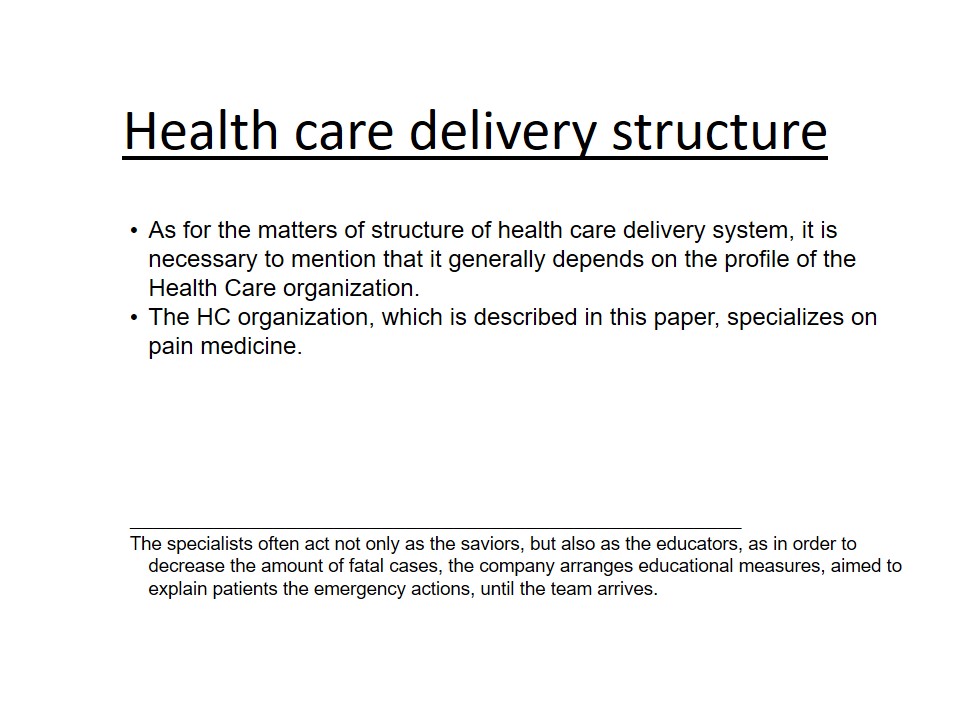
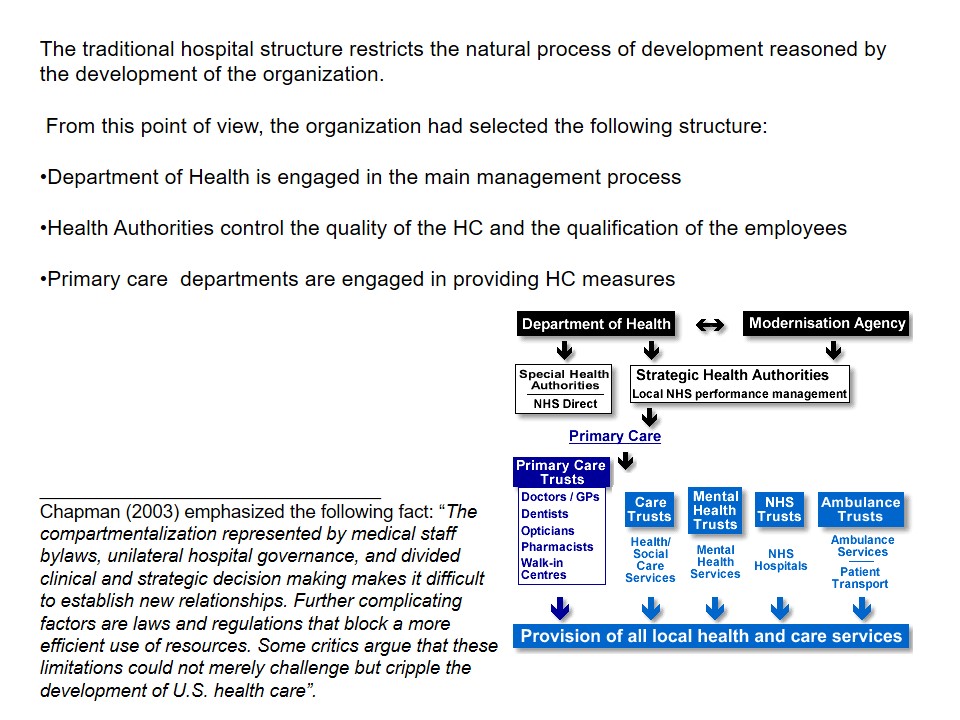
Competitor’s system
The majority of the companies-competitors prefer more traditional structure, which allows simple classification of the activity and attachment of the new links to the overall structure. It is shown in the chat, that the company may be subjected to further extension, as the structure presupposes the attachment of local groups.
On the other hand, this structural arrangement has a very serious disadvantage.
In comparison with the previously regarded structure, this one mainly focuses on the management, but not on the health care as the central activity of the company.
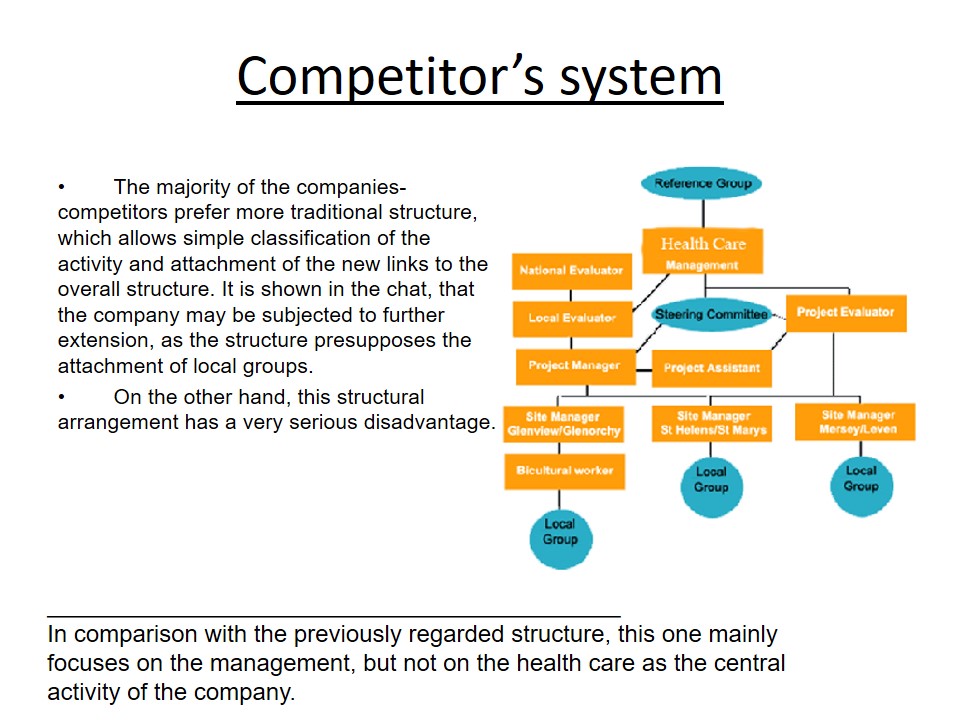
Impact of licensing and Regulatory Factors on Health Care
As for the issues of licensing and regulatory factors, the following notion should be emphasized: Sustainable success can be derived from maintaining an acute awareness and timely exploitation of opportunities and threats that arise from healthcare financing systems, epidemiology and therapeutic forecasts, pricing and reimbursement policies, licensing sales trends, IP protection and leading player dynamics. Emerging Pharmaceutical Markets is a new report published by Business Insights, examining the external, regulatory and competitive environments of emergent markets in 24 countries across Asia, Central and Eastern Europe, and Latin America. (Gregg, 2003).
It is also stated that the influence of licensing regulations and rules in the sphere of market penetration capacity within these States is assessed, and the tendencies that generally impact market capabilities are profiled.
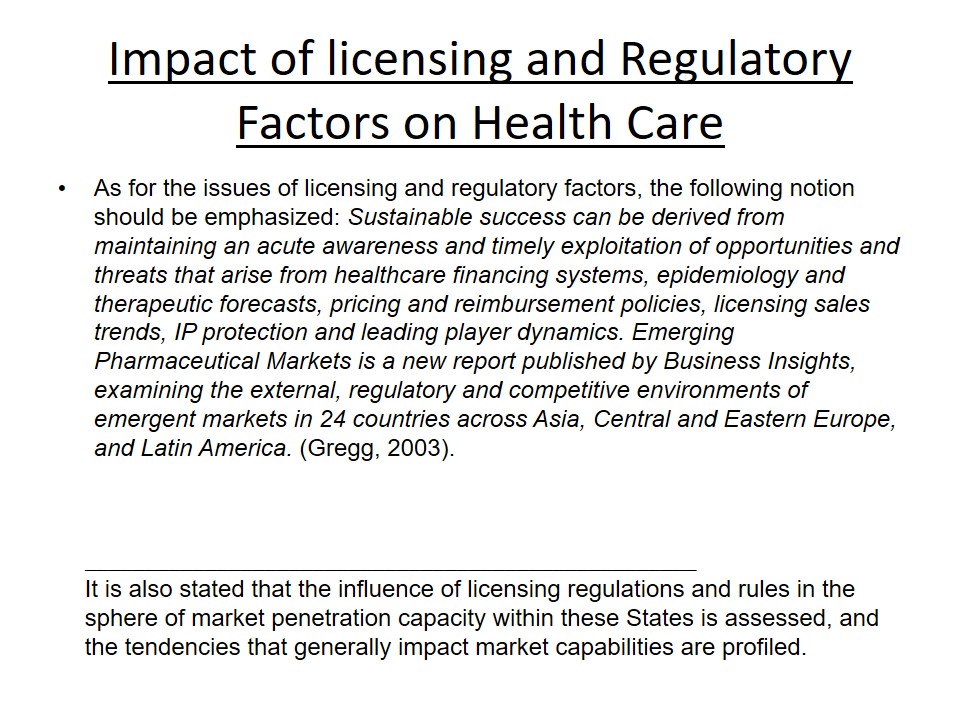
Changes in the Economy
Taking into account the matters of licensing and regulation of the health care sphere, it is necessary to mention that these are the issues which are very important.
However, they are regarded as the most difficult to observe by the business owners. Independently on the size of the business, are subjected to strict observation of laws and regulations.
According to Licensing and Regulatory Affairs Committee, is was resolved that Health Care policy should be provisionally approved and subjected to further discussion of the suggestions of a health care sphere resolution.
The aim of this resolution is to provide the Committee with as much information as is currently achievable regarding the power to make a health care sphere resolution and the implications of doing so, in order that the Council’s Health Care Policy may be finalized and recommended to Council for adoption. (Morone, Belkin, 2004)
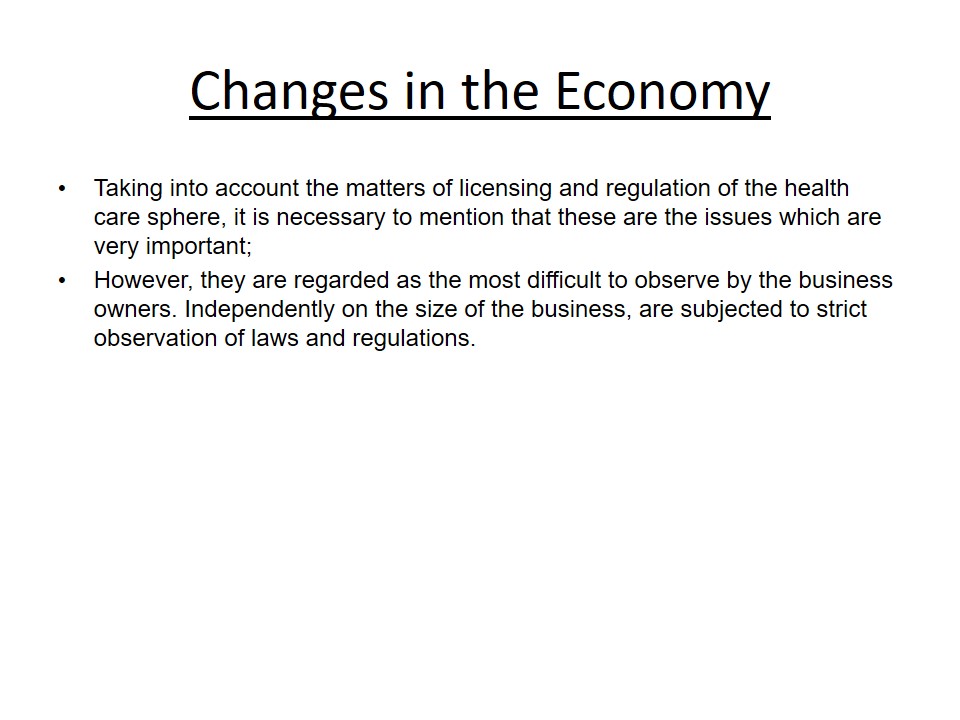
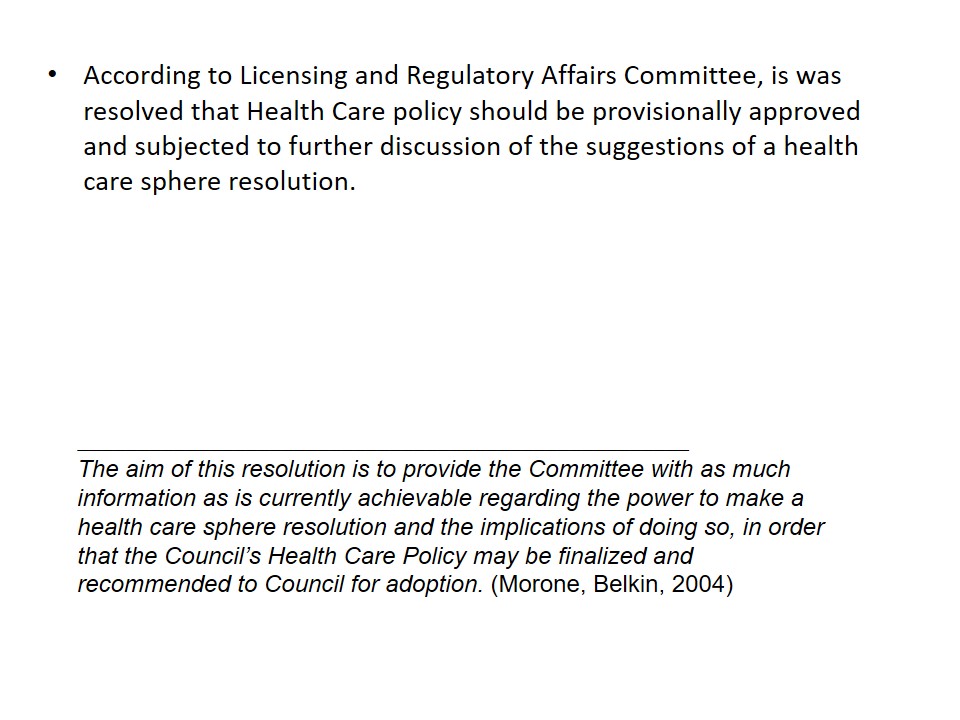
Competition and Pricing
By the means of joining personal experience and national headlines Chapman (2003) discovered the broad disparity in the pricing of Health Care: “Recent headlines varying from the Wal-Mart $4-per-month general prescription pricing test to increasing coverage of overseas surgery options helped make the case. Yet in most instances, health-care pricing is largely hidden from consumers. And most consumers today, at least the fully-insured ones, have no real reason to care”, ‑ nevertheless, as the employers back away from their health care coverage, the indicators are floating, thus, the sphere will experience real exposure to the pricing strategies of the health care.
Taking into account the matters of insurance, it is necessary to mention that affordable health insurance will inevitably signify higher deductibles thus higher out-of-pocket expenses. On the other hand the underinsured and uninsured competitors of the market will be obliged to increase costs and prices in order to compensate the possible financial risks.
There is strong necessity to have a well composed and properly incorporates insuring strategy, which will protect both their employees and their patients. Uninsured companies generally have to focus on the economic principles based on frequent loss of employees and the inability to pay or qualify for health insurance with Medicare.
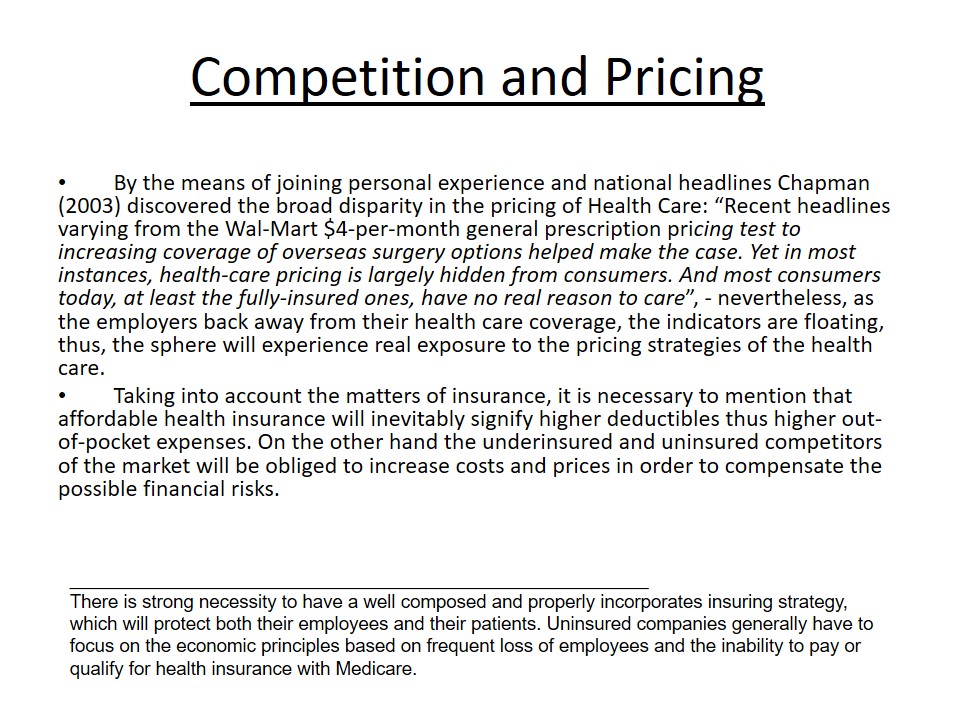
Quality Indicators
Getzen (2007) emphasized on the issues of quality management and indicators in the sphere of Health Care management and delivery the following notion: “The Health Care Quality Indicators Projects generally respond to the increasing interest by healthcare regulators and researchers in OECD countries in defining and measuring the quality of medical care.
Quality indicators are regarded as the indicators for the technical quality with which medical care is provided, i.e. measures of health outcome or health improvement attributable to medical care. Such measures could be said to represent the ‘value’ side of the ‘value for money’ equation in health care – a key issue in measuring the performance of health systems.”
Mots of the countries, which participate in OECD have already defined and founded national strategies and regulations on the issues of defining the quality indicators of the health care industry, mainly concerning the performance measurement setting.
Those attempts originated essential progress in the sphere of quality standards implementation within hospitals and clinics. Nevertheless, the national activities towards HC organizations do not originate the appearing of the internationally comparable indicators, as there is essential lack of international agreement on the most indicators and lots of definitions of every indicator that may be adopted ad thoroughly examined in practice.
It should be emphasized that the quality indicators which impact the pricing in the local level originate from the international health care structure, nevertheless, their impact differs essentially.
The spheres , which are impacted are either customer care or HR policy. Often, these indicators and standards impact the process of treatment and surgery, as the requirements towards the equipment may change.
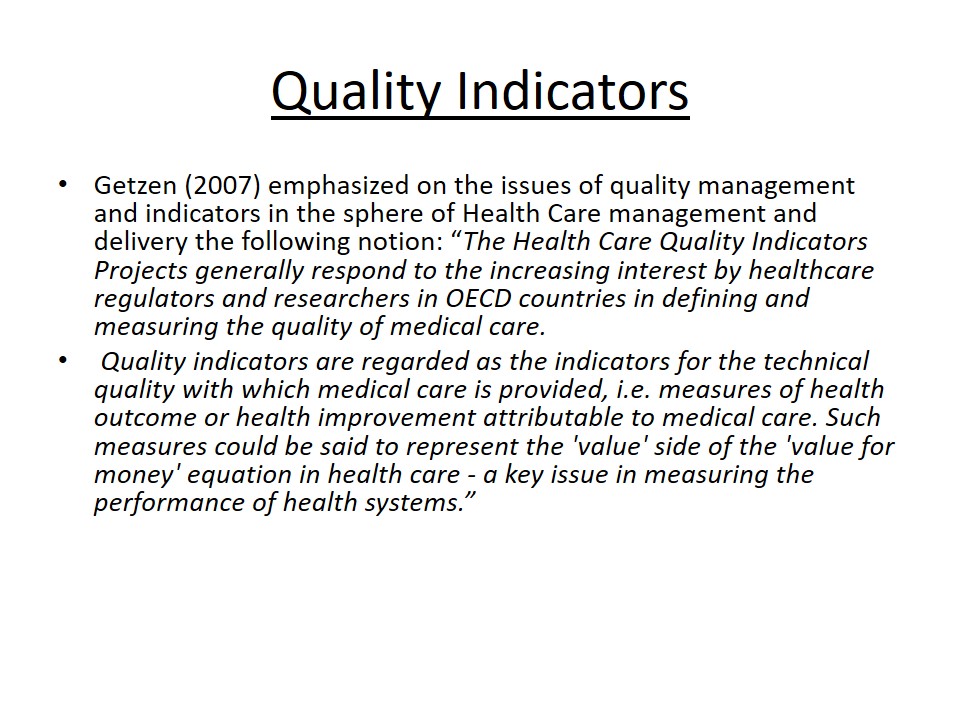
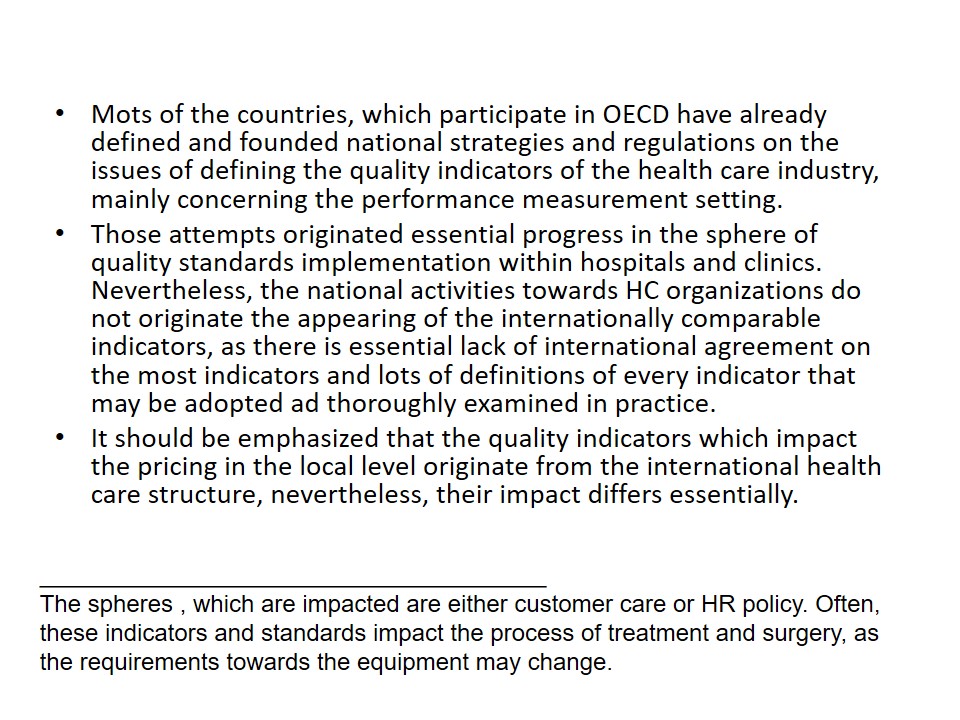
References
Getzen, T.E. (2007). Health economics and financing (3rd ed.) Hoboken, NJ.: John Wiley and Sons, Inc.
Chapman, A. R. (Ed.). (2003). A Human Rights Approach A Human Rights Approach. Washington, DC: Georgetown University Press.
Gregg Bloche, M. (Ed.). (2003). The Privatization of Health Care Reform: Legal and Regulatory Perspectives. New York: Oxford University Press.
Morone, J. A. & Belkin, G. S. (Eds.). (2004). The Politics of Health Care Reform: Lessons from the Past, Prospects for the Future. Durham, NC: Duke University Press.